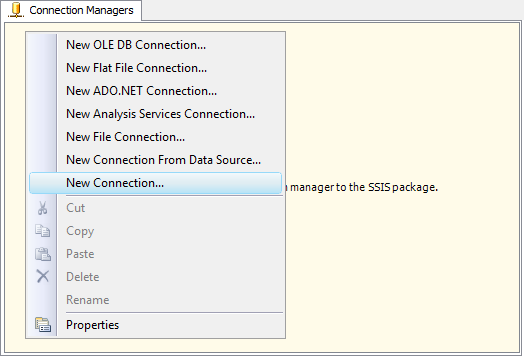Using the Google AlloyDB Connection Manager
The Google AlloyDB Connection Manager is an SSIS connection manager component that can be used to establish connections with Google AlloyDB instances.
To add a Google AlloyDB connection to your SSIS package, right-click the Connection Manager area in your Visual Studio project, and choose "New Connection..." from the context menu. You will be prompted with the "Add SSIS Connection Manager" window. Select the "Google AlloyDB" item to add the new Google AlloyDB Connection Manager.


The Google AlloyDB Connection Manager contains the following two pages which configure how you want to connect to Google AlloyDB.
- General
- Advanced
General Page
The General page of Google AlloyDB Connection Manager allows you to specify the server host details and credentials for authentication.

- Server
-
- Host
-
The host's domain name or the address for the instance.
- Port
-
The port number of the instance.
- Timeout
-
The Timeout (secs) option allows you to specify a timeout value in seconds for the connection. The maximum value for timeout is 600 seconds.
- Authentication
-
- Username
-
The username of the account that will be used to connect to the database instance.
- Password
-
The password of the provided user account.
- Database
-
- Database
-
The databases that are accessible by the credentials provided above would be available in this field.
SSH Tunnel Page
The SSH Tunnel page of Google AlloyDB Connection Manager allows you to specify the SSH details and credentials for authentication.

- SSH Server
-
- Host Name
-
The host's domain name or the address for the instance.
- Port
-
The port number of the instance.
- SSH Authentication
-
- Username
-
The username of the account that will be used to connect to the database instance.
- Password
-
The password of the provided user account.
- Path to Key File
-
The path to the private key file that will be used to connect to the database instance.
- Key File Password
-
The password of the provided private key.
Advanced Page
The Advanced page contains the possible settings for Google AlloyDB connection. Clicking on a specific setting will display a description for the selected property at the bottom of the Advanced page.

It has the below sections which you can work with:
- General
- Miscellaneous
- Performance
- Pooling
- Security and Encryption
- Timeouts and Keepalive

